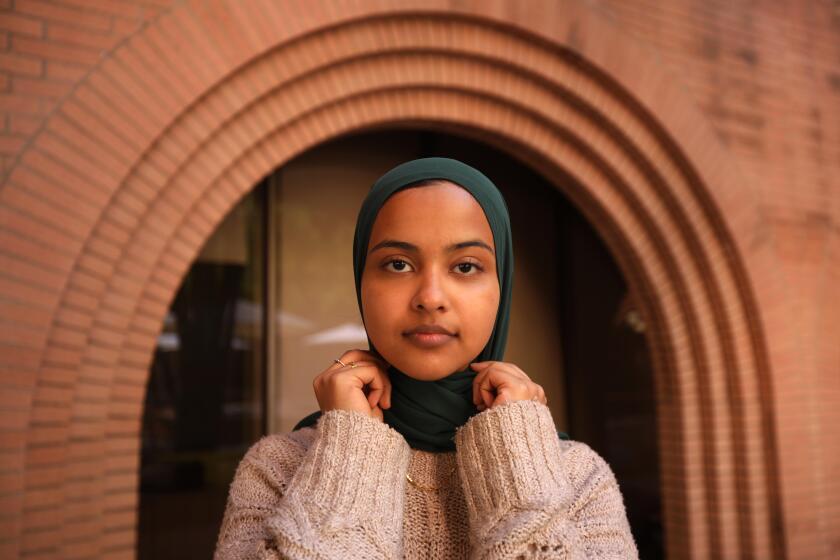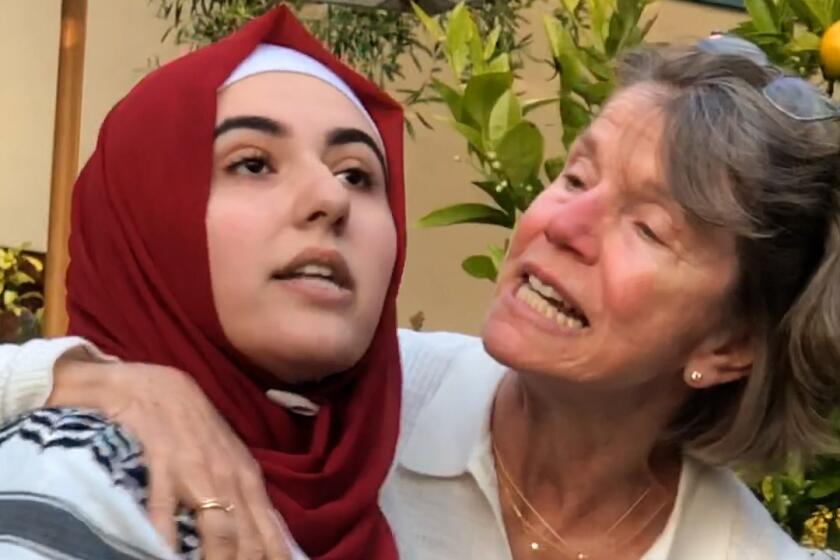Tensions grow at California universities as Gaza protests roil campuses from Berkeley to New York

- Share via
Officials shut down the campus of Cal Poly Humboldt on Monday night after masked pro-Palestinian protesters occupied an administrative building and barricaded the entrance as Gaza-related demonstrations roiled campuses across the nation.
Three students were arrested after law enforcement officers wearing helmets and riot shields descended on the public university in Arcata, in rural Northern California, and clashed with demonstrators who had set up tents inside Siemens Hall and erected a banner that said, “STOP THE GENOCIDE.”
“Free, Free Palestine,” supporters chanted outside the building. “Long Live Resistance!”
As sprawling pro-Palestinian protests and encampments escalate on university campuses across the United States, administrators are reacting with more forceful discipline as they try to balance pro-Palestinian students’ free speech rights with concerns for safety and other students’ counter claims of harassment and disruption.
USC cites safety reasons in canceling the upcoming graduation speech of pro-Palestinian valedictorian from speaking onstage at her ceremony.
At Columbia, in-person classes were canceled Monday and the president asked students to stay home after more than 100 pro-Palestinian demonstrators were arrested last week and protesters established a “Gaza Solidarity Encampment” on a central lawn. Some Jewish students complained they were harassed, even assaulted, by protesters who blocked their movement.
At Yale, at least 60 protesters who camped at Beinecke Plaza were arrested after the university said they refused a final request to leave voluntarily.
At UC Berkeley, students set up a Gaza solidarity encampment at Sproul Plaza — the historic ground zero of the 1960s free speech movement — demanding that UC divest from the Israel-Hamas war.
As hundreds gathered at an encampment at New York University, administrators called on city police to come in after the protest became “disorderly, disruptive and antagonizing” and they learned of reports of “intimidating chants and several antisemitic incidents,” a spokesperson said in a statement,
Tensions flared quickly at Cal Poly Humboldt.
About 4:50 p.m. Monday, campus police received reports of dozens of students occupying the first and second floors of Siemens Hall, the university said in a statement. Classes in the building were canceled and students and faculty who were in the middle of classes were evacuated as protesters “began disrupting classes and vandalizing university property,” the university said.
According to the university, protesters blocked entrances and elevators with tents and in some locations shut doors using chains and zip ties, violating fire codes and “creating extreme safety hazards for those inside.”
After giving the protesters multiple warnings to exit the building voluntarily, campus spokesperson Aileen S. Yoo said the university contacted outside law enforcement agencies to assist in responding.
About 7:45 p.m., an officer told dispatchers that about 100 protesters remained near the building and police had attempted to take students into custody, but the crowd pulled them back, according to a report from Lost Coast Outpost. Another officer called for a pepper ball launcher.
Video footage taken from inside the building showed protesters jumping up and down and chanting, “We are not afraid of you! We are not afraid of you!” as armed officers approached the glass doors of Siemens Hall.
As protesters blocked police from entering, a law enforcement officer beat a protester with a baton and a protester beat the officer’s helmet with an empty five-gallon water jug.
The two sides sparred for several minutes before the protesters finally forced the police back outside.
By 8:30 p.m., Cal Poly Humboldt issued an emergency alert warning that the campus was closed through Wednesday “for the safety of the campus community.”
After locking campus buildings and cutting off key card access, the university advised students and faculty to “avoid the area of the building, as it is a dangerous and volatile situation.” Employees and students were advised to pivot to remote learning.
As night fell, protesters outside the building clapped and chanted, “Free Palestine!” and “Cops go home!”
Inside the building, a masked protester wearing black held up a sign that read: “HELP US PLEASE. THEY ARE GOING TO ATTACK.”
Protesters inside also held signs that urged supporters outside to resist law enforcement: “There are more of u than them” and “PUSH THEM OUT!”
Around 11 p.m., law enforcement officers left the front of Siemens Hall, according to Lost Coast Outpost.
On Wednesday, a smattering of protesters gathered by the landmark Tommy Trojan statue, some calling on USC President Carol Folt to reverse course as arguments broke out between those on opposing sides.
As dozens of protesters remained barricaded inside Siemens Hall on Tuesday afternoon, other buildings remained locked down and in-person classes were canceled. Students were advised to check with their instructors or supervisors for instructions on remote classes.
The university said administrators were concerned about the safety of the students inside the building and urged them to discuss a peaceful resolution.
“The University supports free speech through open dialogue that is respectful and constructive,” the university said. “There are many avenues and options to express views that don’t involve disrupting operations and vandalizing campus, which interferes with the campus community’s rights to a safe and peaceful environment.”
Humboldt for Palestine, a group that did not organize the protest but amplified the protesters’ demands, said in a statement on Instagram on Tuesday that the students would not leave until the university divested from Israeli “occupation and the ongoing genocide.”
“We will not negotiate us leaving until they divest,” Humboldt for Palestine wrote Tuesday on behalf of the students. “After that is met, then we will have further demands. But we are not leaving or moving or talking until they have completely divested from israel.”
“The liberation of Palestine is the focal point of this work at this time,” they added. “Free Palestine from the river to the sea.”
The group urged students and members of the community to descend on the Cal Poly Humboldt campus to protect the students as they demanded the institution disclose all holdings and collaborations with Israel, cut all ties with Israeli universities, and drop all “charges and attacks” on student organizers as well as an immediate cease-fire in Gaza.
“Go to the campus as soon as you can!”
Asked if students could face academic consequences for occupying the building and taking part in the protest, Yoo said: “If students are found in violation of student conduct policies, they may be subject to disciplinary action.”
UC Berkeley professor Erwin Chemerinsky and his wife, professor Catherine Fisk, got into a heated argument with a pro-Palestinian protester during a dinner at their home.
Since the beginning of the Israel-Hamas war, universities such as Columbia, Stanford and Berkeley have faced intense pressure to restrict pro-Palestinian protests and encampments that accuse Israel of genocide and call for a cease-fire. Some Jewish students and faculty have complained protesters have blocked their movement and harassed them.
In February, Columbia implemented interim rules for demonstrations that included a requirement of two days’ notice, prohibition on protests in academic spaces and consequences for violations.
At Stanford, after activists set up a sprawling encampment on White Plaza for months, administrators enforced a camping ban in February “out of concern for the health and safety of our students.”
Berkeley’s chancellor announced last month she was setting up a group to reexamine the university’s rules on protests after pro-Palestinian students blocked the middle section of Sather Gate, the entrance to Sproul Plaza, for months with yellow caution tape and banners.
As new protests erupted on the plaza this week, UC Berkeley Assistant Vice Chancellor Dan Mogulof said that Berkeley would prioritize students’ academic interests in the last few weeks of the spring semester.
“We will take the steps necessary to ensure the protest does not disrupt the university’s operations,” Mogulof said in a statement. “There are no plans to change the university’s investment policies and practices.”
According to the Foundation for Individual Rights and Expression, students do not have a 1st Amendment right to camp on campus grounds.
“Peaceful protest is generally protected, and colleges and universities must ensure students can engage in peaceful protest on campus,” the foundation said in a statement. “But we remind students that engaging in civil disobedience may result in punishment, including arrest. ... Students occupying campus spaces in violation of reasonable, content-neutral rules risk punishment.”
Jameel Jaffer, executive director of the Knight First Amendment Institute at Columbia University, raised concerns Monday about bringing in the New York Police Department to dismantle a student encampment and arrest students who were peacefully protesting.
In a letter to university President Minouche Shafik, Jaffer wrote that he was “deeply troubled” by the university’s “severe and seemingly viewpoint-discriminatory enforcement of rules relating to student demonstrations.”
“The University has a legitimate interest in enforcing reasonable restrictions on the time, place, and manner of protests,” Jaffer wrote. “The University’s rules also make clear, however, that external authorities should be engaged to end a protest only as a last resort — only when there is ‘a clear and present danger to persons, property, or the substantial functioning of any division of the University.’”
More to Read
Sign up for Essential California
The most important California stories and recommendations in your inbox every morning.
You may occasionally receive promotional content from the Los Angeles Times.















